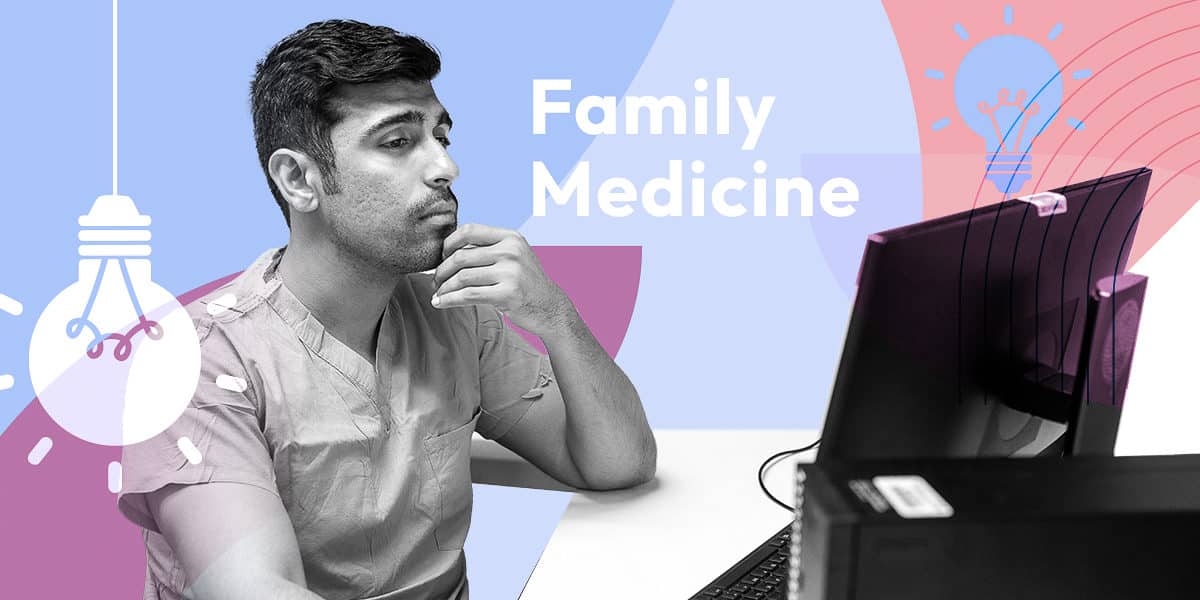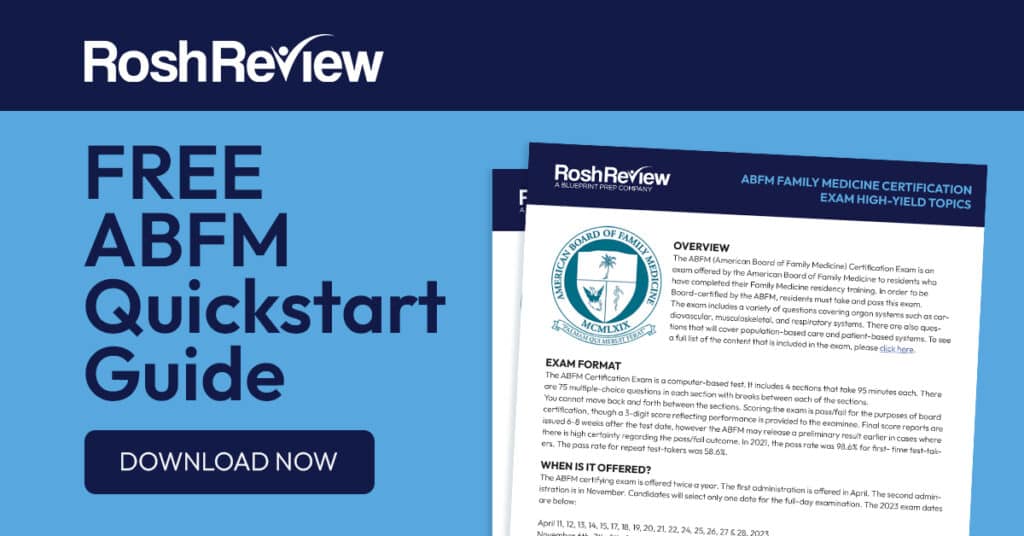Family Medicine Residency: Which Scholarly Pursuits Should I Consider?

Embarking on residency is a daunting prospect. We’ve heard the horror stories of residents who exceed the 80-hour work-week limit, endure grueling calls, and take ownership of acutely sick patients on inpatient rotations. Admittedly, residents work long hours and go through difficult training in the pursuit of medical proficiency. I would never go so far as to say that residency is easy, or that free time is abundant. With that in mind, however, there are opportunities and time outside of working hours for you to develop your professional and scholarly interests during family medicine residency.
Speaking from personal experience as a recent graduate and chief of a family medicine residency, I had time for professional and scholarly pursuits in my program, especially after completing my internship year. Of course, every residency program will vary in the amount of work that they expect residents to do. For the most part, residency programs want to see their residents succeed in many aspects, not purely the clinical. Having well-rounded residents who participate in scholarly pursuits will bring recognition to the program, which is a win-win situation. Therefore, it is within residency programs’ best interests to leave space for their residents to pursue scholarly interests.
Which scholarly pursuits should I consider?
Everyone has different goals in residency. Some go into residency knowing they want to pursue a certain fellowship or work in academia. Others know they want to eventually work in a rural location and be purely clinical to practice full-scope family medicine. Then, there are residents who don’t know exactly what their future might look like in five years.
Luckily, there are a variety of different ways to involve yourself in scholarly pursuits, depending on your goals. It doesn’t have to mean everyone becomes a first author for papers published in prestigious journals. I recommend seeking out opportunities that will help you reach your goals and excel in your future role.
1. Improving your knowledge base
Start studying for the ABFM boards
A great way to kill two birds with one stone is to study for the ABFM boards, especially when first starting out in residency. This will not only prepare you for the inevitable moment of taking in-training exams and boards prior to graduation but will also increase your knowledge base and help you improve your clinical patient care during residency. Building up a knowledge base is a prerequisite for most things, including understanding more nuanced aspects of research or keeping up with clinical updates in the literature.

Studying for the ABFM board exam in 2024? Download the FREE ABFM Quickstart Guide to learn all about the exam format, topics, and more!
Dive into clinical cases
Delving further into interesting clinical cases or pathology that you see on rotation is another way to build foundational knowledge. This is a tried-and-true method for medical students on clinical rotations because it helps connect what otherwise might be obscure pathology to real-life experience. Better yet, if there’s a medical student on your service, you can have them present a few interesting clinical pearls to help teach the team. If you have time, consider teaching interesting cases on the rotation as well. Teaching a topic helps you learn it better yourself, and plus, your medical students will appreciate you for it!
Subscribe to medical journals
Subscribing to medical journals is also a great way to work on continuing medical education and developing your knowledge base. Below are some choice examples pertinent to family medicine.
- New England Journal of Medicine (NEJM) – Widely considered to be the most respected and well-read general medicine journal, NEJM should be a staple for a primary care physician to stay updated in the medical field.
- The Journal of the American Medical Association (JAMA) – JAMA contains top articles from all of AMA’s specialty journals and is the most widely circulated general medical journal in the world.
- American Family Physician – Published by the American Academy of Family Physicians, the journal provides readable, patient-centered and evidence-based articles in a comprehensive manner.
2. Pursuing research projects
Connect with mentors
Starting out in research can be intimidating—where does one begin? Seeking faculty or upper-level mentors is a great starting point. Some upper-level residents may be looking to pass their research and Quality Improvement (QI) projects onto other residents upon graduation. Connecting with upper-level residents can also give you an idea of how much time you can devote to research outside of clinical duties. They often also know the guidelines for submitting to academic journals and conferences.
If there are no upper-level residents with similar research interests, they can likely connect you with faculty contacts who are open to working with residents. If you have a research interest in mind and other residents in your program have not been research-minded in the past, it may be more difficult to get your foot in the door, but it can be done. Establish relationships with faculty who you worked with on rotations, as you can write up interesting cases together. Make sure to clearly communicate your interest in pursuing research, as faculty can keep you in mind for any interesting cases they come across.
Present your work
Additionally, residency programs often have didactic requirements such as an annual QI project, or critical review of the literature. If you create a strong project, you can also submit it to a conference. Big national family medicine conferences include AAFP National Conference and FMX conference. These will often have a call for abstracts months prior to the annual conference date. Residents are welcome to submit their projects to potentially present a poster or a spoken presentation at the conference. Many residency programs provide CME days and even funding to attend these conferences for residents’ scholastic and professional development.
On a smaller scale, you can also work on presentations to give during in-program didactics. These projects include case reports, morbidity and mortality (M&M) cases, or board review sessions to help improve presentation skills.
3. Preparing for a fellowship
Another pursuit that you can incorporate into your clinical time is learning a new skill to prepare for a fellowship. Whether you have your heart set on a fellowship or you’re still exploring, you can gauge your interest through electives.
For example, if you’re seeking an OB/GYN fellowship, try to increase your number of deliveries and log them. If you’re seeking a sports medicine fellowship, see if you can work with a sports medicine faculty to get involved in high school sporting events or sports physicals. Perfecting procedural skills such as joint injections during your elective months can be incredibly beneficial as well.
Whichever electives are available to you, take advantage of the opportunity to expand your skill set, develop relationships, and learn about the day-to-day to make sure a specialty is the right fit for you.
4. Taking a leadership role
Leadership roles may not necessarily be “scholarly pursuits” but will boost your professional development and look great on your resume. This is a way to feel more kinship with your program, while also potentially changing aspects that need improvement. Having a leadership role will teach you the people-management skills that you will inevitably encounter in the “real world” and provide networking opportunities with faculty in the program that make you stand out among the rest.
Being a leader does not necessarily mean you have to run for chief resident, which is a lot of responsibility. Becoming social chair and organizing events such as resident retreats or quarterly wellness events can be just as fulfilling. People will appreciate you for it!
Another great way to become a leader is by participating in your program’s annual residency recruitment or interview processes. You could also join a residency council, which often organizes events and provides opportunities for residents to share feedback. Taking on some form of leadership role shows your program you have a level of commitment and dedication to your colleagues and are an active participant in making things better.
In conclusion
Other than the examples listed here, there are so many more options available out there. In this digital age, many residents are using social media to educate and connect with the public. There are resident physicians who run medical or medical-adjacent podcasts.
As you can see, the definition of scholarly pursuits can vary greatly and include many different aspects of professional development. There are many opportunities for scholarly pursuits built into residency and outside of residency that are available to residents. The time spent outside of residency dedicated to these pursuits ultimately depends on your professional goals and personal passions. Building relationships with upper-level residents, peers, and faculty mentors can guide you along the way, as well as help you gauge what amount of scholarly activity is realistic with your limited time. Ultimately, the best part is you can pursue what most aligns with your personal interests and goals!
Rosh Review is a board review company providing Qbanks that boost your confidence for your boards and beyond. Get started with a Rosh Review free trial to the Qbank of your choice (no credit card required!) and gain access to board-style practice questions, detailed explanations, beautiful medical images, and more.





Comments (0)